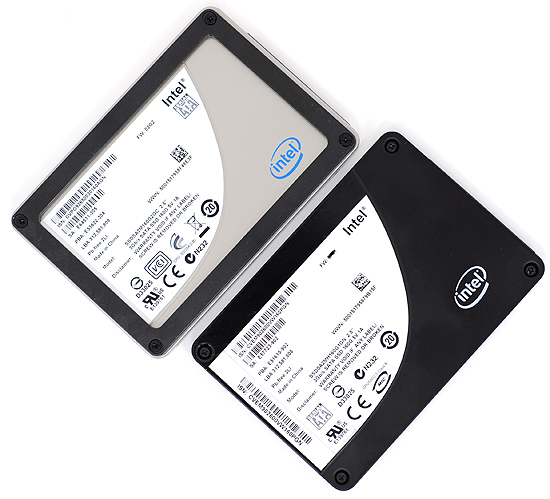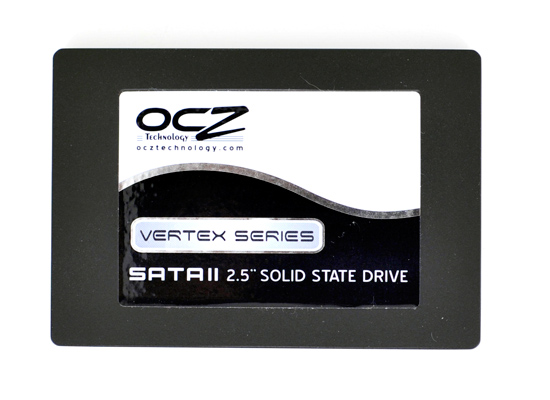The SSD Relapse: Understanding and Choosing the Best SSD
by Anand Lal Shimpi on August 30, 2009 12:00 AM EST- Posted in
- Storage
One Tough Act to Follow
What have I gotten myself into? The SSD Anthology I wrote back in March was read over 2 million times. Microsoft linked it, Wikipedia linked it, my esteemed colleagues in the press linked it, Linus freakin Torvalds linked it.
The Anthology took me six months to piece together; I wrote and re-wrote parts of that article more times than I'd care to admit. And today I'm charged with the task of producing its successor. I can't do it.
The article that started all of this was the Intel X25-M review. Intel gave me gold with that drive; the article wrote itself, the X25-M was awesome, everything else in the market was crap.

Intel's X25-M SSDs: The drives that started a revolution
The Anthology all began with a spark: the SSD performance degradation issue. It took a while to put together, but the concept and the article were handed to me on a silver platter: just use an SSD for a while and you’ll spot the issue. I just had to do the testing and writing.

OCZ's Vertex: The first Indilinx drive I reviewed, the drive that gave us hope there might be another.
But today, as I write this, the words just aren't coming to me. The material is all there, but it just seems so mature and at the same time, so clouded and so done. We've found the undiscovered country, we've left no stone unturned, everyone knows how these things work - now SSD reviews join the rest as a bunch of graphs and analysis, hopefully with witty commentary in between.
It's a daunting, no, deflating task to write what I view as the third part in this trilogy of articles. JMicron is all but gone from the market for now, Indilinx came and improved (a lot) and TRIM is nearly upon us. Plus, we all know how trilogies turn out. Here's hoping that this one doesn't have Ewoks in it.
What Goes Around, Comes Around
No we're not going back to the stuttering crap that shipped for months before Intel released their X25-M last year, but we are going back in the way we have to look at SSD performance.
In my X25-M review the focus was on why the mainstream drives at the time stuttered and why the X25-M didn't. Performance degradation over time didn't matter because all of the SSDs on the market were slow out of the box; and as I later showed, the pre-Intel MLC SSDs didn’t perform worse over time, they sucked all of the time.
Samsung and Indilinx emerged with high performance, non-stuttering alternatives, and then we once again had to thin the herd. Simply not stuttering wasn't enough, a good SSD had to maintain a reasonable amount of performance over the life of the drive.
The falling performance was actually a side effect of the way NAND flash works. You write in pages (4KB) but you can only erase in blocks (128 pages or 512KB); thus SSDs don't erase data when you delete it, only when they run out of space to write internally. When that time comes, you run into a nasty situation called the read-modify-write. Here, even to just write 4KB, the controller must read an entire block (512KB), update the single page, and write the entire block back out. Instead of writing 4KB, the controller has to actually write 512KB - a much slower operation.
I simulated this worst case scenario performance by writing to every single page on the SSDs I tested before running any tests. The performance degradation ranged from negligible to significant:
| PCMark Vantage HDD Score | New | "Used" |
| Corsair P256 (Samsung MLC) | 26607 | 18786 |
| OCZ Vertex Turbo (Indilinx MLC) | 26157 | 25035 |
So that's how I approached today's article. Filling the latest generations of Indilinx, Intel and Samsung drives before testing them. But, my friends, things have changed.
The table below shows the performance of the same drives showcased above, but after running the TRIM instruction (or a close equivalent) against their contents:
| PCMark Vantage HDD Score | New | "Used" | After TRIM/Idle GC | % of New Perf |
| Corsair P256 (Samsung MLC) | 26607 | 18786 | 24317 | 91% |
| OCZ Vertex Turbo (Indilinx MLC) | 26157 | 25035 | 26038 | 99.5% |
Oh boy. I need a new way to test.










295 Comments
View All Comments
Anand Lal Shimpi - Monday, August 31, 2009 - link
I believe OCZ cut prices to distributors that day, but the retail prices will take time to fall. Once you see X25-M G2s in stock then I'd expect to see the Indilinx drives fall in price. Resellers won't give you a break unless they have to :)Take care,
Anand
bobjones32 - Monday, August 31, 2009 - link
Another great AnandTech article, thanks for the read.Just a head's-up on the 80GB X-25m Gen2 - A day before Newegg finally had them on sale, they bumped their price listing from $230 to $250. They sold at $250 for about 2 hours last Friday, went back out of stock until next week, and bumped the price again from $250 to $280.
So....plain supply vs. demand is driving the price of the G2 roughly $50 higher than it was listed at a week ago. I have a feeling that if you wait a week or two, or shop around a bit, you'll easily find them selling elsewhere for the $230 price they were originally going for.
AbRASiON - Monday, August 31, 2009 - link
Correct, Newegg has gouged the 80gb from 229 to 279 and the 160gb from 449 to 499 :(Stan Zaske - Monday, August 31, 2009 - link
Absolutely first rate article Anand and I thoroughly enjoyed reading it. Get some rest dude! LOLJaramin - Monday, August 31, 2009 - link
I'm wondering, if I were to use a low capacity SSD to install my OS on, but install my programs to a HDD for space reasons, just how much would that spoil the SSD advantage? All OS reads an writes would still be on the SSD, and the paging file would also be there. I'm very curious about the amount of degradation one would see relative to different use routines and apps.Anand Lal Shimpi - Monday, August 31, 2009 - link
Putting all of your apps (especially frequently used ones) off of your SSD would defeat the purpose of an SSD. You'd be missing out on the ultra-fast app launch times.Pick a good SSD and you won't have to worry too much about performance degradation. As long as you don't stick it into a database server :)
Take care,
Anand
swedishchef - Tuesday, September 1, 2009 - link
What if you just put your photoshop cache on a pair of Velociraptors? Would it be the same loss of benefit?I have the same question regarding uncompressed HD video work, where I need write speeds well over the Intel x25-m ( over 240Mb/s). My assumption would be that I could enjoy the fast IO and App. launch of an SSD and increase CPU performance with the SSD while keeping the files on a fast external or internal raid configuration.
Thank you again for a a brilliant Article Anand.
I have been waiting for it for a long time. Yours are the only calm words out on the net.
Grateful Geek /Also professional image creator.
creathir - Monday, August 31, 2009 - link
Great article Anand. I've been waiting for it...My only thoughts are, why can't Intel get their act together with the sequential business? Why can the others handle it, but they can't? To have such an awesome piece of hardware have such a nasty blemish is strange to me, especially on a Gen-2 product.
I suppose there is some technical reason as to why, but it needs to be addressed.
- Creathir
Anand Lal Shimpi - Monday, August 31, 2009 - link
If Intel would only let me do a deep dive on their controller I'd be able to tell you :) There's more I'd like to say but I can't yet unfortunately.Take care,
Anand
shotage - Monday, August 31, 2009 - link
Awesome article!I'm intrigued with the cap on the sequential reads that Intel has on the G2 drives as well. I always thought it was strange to see even on their first gen stuff.
I'm assuming that this cap might be in place to somehow ensure the excellent performance they are giving with random read/writes. All until TRIM finally shows up and you'll have to write up another full on review (which I eagerly await!).
I can't wait to see what 2010 brings to the table. What with the next version of SATA and TRIM just over the horizon, I could finally get the kind of performance out of my PC that I want!!